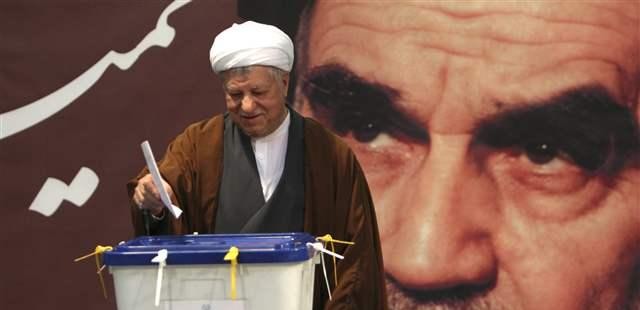PHOTO: Hashemi Rafsanjani casts his vote in the 2016 Parliamentary elections
Iran is preparing for politics without Hashemi Rafsanjani, prominent in the regime since the 1979 Islamic Revolution, after the sudden death of the former President on Sunday.
Rafsanjani, 83, suffered the attack about 6 p.m. (1430 GMT) and passed away about 90 minutes later at Shohada Tajrish Hospital in northern Tehran. President Hassan Rouhani was present.
See Iran Breaking: Ex-President Rafsanjani is Dead
Rafsanjani became Speaker of Parliament soon after the 1979 revolution. As head of the Assembly of Experts, he was influential in the selection of Ayatollah Khamenei as Supreme Leader after the death of the founder of the Islamic Republic, Ayatollah Khomeini, in 1989. Months later, he was elected President, serving two terms until 1997.
Although embattled within the regime since the 2009 mass protests over the disputed Presidential election, he still held the chair of the Expediency Council. Regarded as Rouhani’s mentor, he regained influence following his protégé’s surprise victory in the 2013 Presidential contest.
Despite his tension with the former President — to the point of limiting his power, putting pressure on his family, and endorsing the ban on Rafsanjani’s run for the Presidency in 2013 — the Supreme Leader issued an effusive message of condolence.
Ayatollah Khamenei said, “The loss of a comrade, a companion with whom one has cooperated and felt close to for a full 59 years, is difficult and overwhelming.” Khamenei claimed the political pressure on Rafsanjani in recent years, with accusations that he was supporting “sedition”, was “evil set forth by those who breathed temptation into the minds of people”.
Still the Supreme Leader could not resist a final dig at the man who was alongside, and recently opposed to, him throughout the history of the Islamic Republic. His message called Rafsanjani “Hojetoleslam” rather than the higher clerical rank of Ayatollah.
President Rouhani called Rafsanjani “a great man of the Revolution and politics, the symbol of patience and resistance”.
More Tension and a Blow to the President
Rafsanjani’s death leaves the Supreme Leader as the last surviving member of Khomeini’s inner circle. Equally important is the gap in the Iranian system at another crucial time for the Islamic Republic.
After the dominance of hardliners during the Ahmadinejad Government from 2005 to 2013 and the crushing of dissent following the 2009 election, Rafsanjani was part of a centrist resurgence in the last four years. The Guardian Council’s ban on his Presidential campaign in 2013 backfired when Hassan Rouhani, approved as a consolation candidate, won an unexpected first-round victory.
Defying ongoing hardline criticism and pressure on his family, Rafsanjani resumed a central presence in the regime. While unsuccessful in regaining the chair of the Assembly of Experts, he remained head of the Expediency Council as well as allying with the Rouhani Government. The resurgence was marked by success for the centrist-reformist List of Hope in Parliamentary elections in February 2016, taking the largest share of seats in the Majlis.
Rafsanjani did pull back from some of his ambitious statements, such as his proposal that the Supreme Leader be replaced by a five-cleric council with a limited term after Ayatollah Khameini’s death. His hope, dating from his Presidency in the 1990s, for reconciliation with Saudi Arabia was dashed by the break in relations between Tehran and Riyadh at the start of 2016.
However, as Rouhani’s opponents — notably the Revolutionary Guards, the judiciary, and hardline MPs — have stepped up pressure on the President, Rafsanjani remained an important bulwark for the Government and the hopes of moderates against a return to the politics of 2009. He advocated a constructive relationship with the US as Rouhani and Foreign Minister Mohammad Javad Zarif pursued the July 2015 nuclear deal, and he supported the President’s efforts to open up political and cultural space.
Now Rouhani and the List of Hope face a May 2017 Presidential election without a figure of the Revolution who — while still controversial, disliked by many within the regime, and always surrounded by criticism of his wealth — was an important political strategist.
Mohammad Marandi, a University of Tehran academic known for his ardent promotion of the Supreme Leader’s line, summarized on Sunday, “The passing of Mr. Rafsanjani complicates the President’s position and makes his re-election less certain.”

